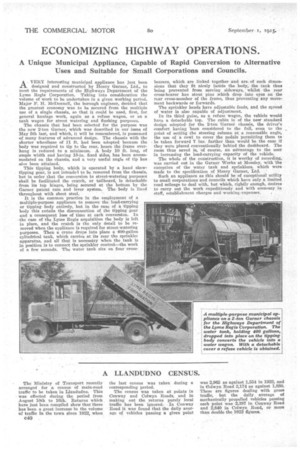ECONOMIZING HIGHWAY OPERATIONS.
Page 24

If you've noticed an error in this article please click here to report it so we can fix it.
A Unique Municipal Appliance, Capable of Rapid Conversion to Alternative Uses and Suitable for Small Corporations and Councils.
AVERY interesting municipal appliance has just been designed and constructed by Henry Garner, Ltd., to meet the requirements of the Highways Department of the Lyme Regis Corporation. Taking into consideration the volume of work to be undertaken in a given working period, Major F. H. McDonnell, the borough engineer, decided that the greatest economy was to be secured from the multiple use of a single chassis, so that it could be used, first, for general haulage work, again as a refuse wagon, or as a tank wagon for street watering and flushing purposes.
The chassis that had been selected for the purpose was the new 2-ton Garner, which was described in our issue of May 5th last, and which, it will be remembered, is possessed of many features of advanced design. The chassis with the shorter wheelbase of 11 ft. had been adopted because the body was required to tip to the rear, hence the frame overhang is reduced to a minimum. A body 10 ft. long, of ample width and having 18-in, fixed sides, has been accommodated on the chassis, and a very useful angle of tip has al4o been attained.
This tipping body, which is operated by a hand skewtipping gear, is not intended to be removed from the chassis, but in order that the conversion to street-watering purposes shall be facilitated the (Tech, or tailboard, is detachable from its top binges, being secured at the bottom by the Garner patent cam and lever system. The body is lined throughout with sheet steel.
It is the common practice in the employment of a multiple-purpose appliance to remove the load-carrying or tipping body entirely, but in the case of a lipping body this entails the disconnection of the tipping gear and a consequent loss of time at each conversion. In -the case of the Lyme Regis acquisition the body is left in place, and the cratch is the only detail to be removed when the appliance is required for street-watering purposes. Then a crane drops into place a 400-gallon cylindrical tank, which carries at its rear the sprinkler apparatus, and all that is necessary when the tank iN in position is to connect the sprinkler control—the work of a few seconds. The water tank sits on four cross bearers, which are linked together and are of such dimensions that they fit nicely inside the body, the tank thus being prevented from moving sideways, whilst the rear cross-bearer has stout pins which drop into eyes on the rear cross-member of the frame, thus preventing any movement backwards or forwards.
The sprinkler heads have adjustable feeds, and the spread of water is also capable of adjustment.
In its third guise, as a refuse wagon, the vehicle would have a detachable top. The cabin is of the new standard design adopted for the 2-ton Garner chassis, the driver's comfort having been considered to the full, even to the point of setting the steering column at a reasonable angle, the use of a cowl to cover the pedals permitting them to be taken forward 7 ins, farther than would be the case if they were placed conventionally behind the dashboard. The roorn thus saved is, 'of course, an advantage to the user in increasing the load-carrying capacity of the vehicle.
The whole of the construction, it is worthy of recording, was carried out in the Garner Works at Moseley, with the exception of the water tank and sprinklers, which were made to the specification of Henry Garner, Ltd.
Such an appliance as this should be of exceptional utility to small corporations and councils which have only a limited road mileage to deal with, but which, rightly enough, desires to carry out the work expeditiously and with economy in staff, establishment charges and working expenses.




























